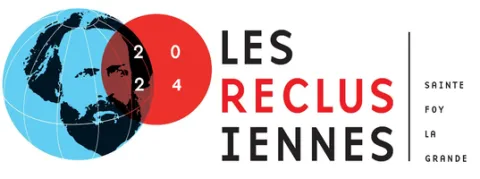
From Le Festival des Reclusiennes
2024 Edition: Co-inhabiting the Earth, from July 9 to 13
The subject of Reclusiennes 2024 is inspired by Élisée Reclus who speaks of the city as an “extended corporeality” and lucidly points out how the place of co-habitation par excellence is necessarily the ground for struggle or meeting of intimate bodies and social, individual and political.
The theme is obviously at the crossroads of numerous approaches, sociology and psychology, urban planning and architecture, city and migration policies, etc.
Well aware of this tight network, we nevertheless propose a few key points, benchmarks for a journey to take together. Faithful to the tradition of popular education in which they are part, Les Reclusiennes brings together scholarly contributions and everyday experiences to encourage an always desired exchange between the different participants, public and speakers.
Thanks to your donation you allow free access to all workshops, shows and concerts.
Program
Tuesday, July 9
10 a.m.-4 p.m., round table
Clarisse Room Brian Reclus
CO-INHABITING THE BODY, THE INTIMATE
Questioning the way in which an individual inhabits his body, the way in which intimate conflicts can play out under a skull, all this invites a small detour towards psychology.
Pregnancy, a body that no longer belongs to itself?
Psychic suffering, being inhabited between solitude and lucidity, reason and unreason.
Homeless, how to adapt to an abusive lifestyle
How to live, be born, grow up in a degraded habitat
5 p.m. EXHIBITIONS
6 p.m. APERITIF-LITERARY
7 p.m. EXHIBITION OPENING
8 p.m. STREET MEAL - CONCERT / SHOW
Wednesday, July 10
10 a.m.-4 p.m., round table
Clarisse Room Brian Reclus
CO-HABITING THE PLACE OF LIVING
What habitat, for what co-habitation.
Habitat chosen or constrained?
Places suffered, from migration to wandering.
Forced movements, or immobility suffered.
Who owns urban space?
Gentrification and ghettoization, two sides of the same city
6 p.m. APERITIF-LITERARY
7 p.m. EXHIBITION OPENING
8 p.m. Meal / Show
Esplanade François Mitterrand
Thursday, July 11
10 a.m.-4 p.m., round table
Clarisse Room Brian Reclus
CO-HABIT, OWN, OWN…OWNERSHIP
Property is a creation and for a long time usage has prevailed over law.
Demarcate your territory to protect access.
What cohabitation of man with animals?
The territories of first peoples, right of use or right of property?
Colonizations still current, sources of conflict and violence
Zones to Defend in France, Greece, Chile, Germany, the United States, etc.
7 p.m., Discovery aperitif
8 p.m. Musical evening
Town Hall Square
Street food / Concert
Friday, July 12
10 a.m., round table
Clarisse Room Brian Reclus
CO-HABITING THE UNHABITABLE
There are places where it is not good to be, made uninhabitable by extreme conditions since time immemorial or due to human activities. Individuals or groups choose or are forced to continue living in these truly uninhabitable places.
Living in a region at war, Ukraine, Tigray, Yemen, Gaza,…
In Fukushima, almost 13 years after the 2011 disaster.
Olympic Games 2024. Is Paris still a habitable city?
Living outside the Earth. Fantasy, utopia, dream, hope... of escaping life on earth or exploiting wealth.
Living in degraded places. An experience of collective, solidarity and mutual aid.
7 p.m., Literary aperitif followed by meal - Public garden
Les Reclusiennes ABC
9:30 p.m. Cinema la Brèche
Film - debate
Saturday, July 13
2 p.m. CONFERENCE
Clarisse Room Brian Reclus
5 p.m. LITERARY APERITIF
7 p.m. EXHIBITION OPENING
6:30 p.m. Clarisse Brian-Reclus Room
Presentation of the Reclusiennes 2024 prize
Poetic synthesis of Reclusiennes 2024
[Franck David]
Saturday 9:00 p.m. Clarisse room Brian Reclus
Closing evening
Reclusiennes? A new festival format which brings together researchers, activists, writers, philosophers, artists and residents in the bastide town of Sainte-Foy-la-Grande in Gironde, birthplace of Élisée Reclus, a 19th century libertarian geographer.
Residents of the bastide, we have formed a collective to resist the marginalization of the Bordeaux metropolis suffered in recent years and we invite researchers and association leaders to debate with us.
In 4 days, 40 events follow one another.
Conferences, concerts, plays, artistic installations, literary aperitifs, films and debates punctuate this “festival of thought”.
Every year at the beginning of July, hundreds of researchers, journalists and community activists from France and Europe meet to discuss Vote (2013), Earth (2014), Migrations (2015), Water ( 2016), the Common Good (2017), Money (2018), Changing Work (2019), Down with the Masks (2020), Communardes, Communards (2021), Let's escape! (2022).
A place
Birthplace of Elisée, Sainte-Foy-la-Grande is often at the center of debates, during conferences but also during discussions and meetings in cafes, during street meals and at the cinema.
Elisée Reclus
Jacques Élisée Reclus was born on March 15, 1830 in Sainte-Foy-la-Grande (Gironde) and grew up in Aquitaine where his father was a pastor. His siblings include fourteen surviving children, including Élie (1827-1904), ethnologist and anarchist, to whom he was very close throughout his life. His father intended him to become a pastor and sent him to Prussia, to a college run by the Moravian brothers where he joined Élie. The two brothers fled in 1844. Élisée continued his studies at Sainte-Foy-la-Grande, then at the Protestant theological faculty of Montauban. But the two brothers run away again and are excluded from the institution.
Élisée Reclus left for Berlin where he took lessons from the German geographer Carl Ritter, one of the founders of modern geography, who had a profound influence on him. Returning to France in the fall of 1851, he was forced, with Élie, because of their political positions, to leave the country after the coup d'état of December 2, 1851. Élisée Reclus traveled to London then to Ireland, before He arrived in Louisiana in 1853. He became a tutor in a family of planters of French origin, but could not stand slavery and returned to sea. He landed in New Granada where he founded a farm.
Through writing, Élisée Reclus aims to be a geographer outside of state institutions , to address everyone through a common language capable of defending a libertarian vision of the world, to make the surface of the globe visible to the imagination and to suggest its beauty through that of the style. Being a writer is first and foremost for Élisée Reclus the means of making a living from geography on the fringes of the academic institutionalization of the discipline. For forty-five years, most of its income came from royalties paid by Hachette. He published travel stories (1860-1874) and tourist guides (1860-1870), participated in dictionaries (1864-1905), and above all gave his encyclopedic New Universal Geography which ensured him regular remuneration from 1872 to 1905. Reclus n However, he is not a supporter of intellectual property rights: the plagiarisms, borrowings and wild translations of his work participate in the circulation of knowledge, with his anarchist-communist approval. In Evolution, Revolution and the Anarchic Ideal (1898), the geographer believes that “the scientist has his immense usefulness as a quarryman: he extracts the materials, but it is not he who uses them, it is the people, to all the associated men who it is up to to raise the edifice.
He produced an abundant literary and scientific work, while continuing his political activities . His major works are Man and the Earth and Universal Geography. He is considered the greatest geographer of his time, and as a precursor of ecology, very modern in his non-conformist way of life. Reclus believed in the possible existence of a universal, just society, where each individual would be respected and would know how to respect others once men had gotten rid of oppressors, monopolists, among others the State, source of power and wealth. powers, therefore domination.
But what brings us closer to Élisée Reclus is the desire to decipher the world with honesty, to not mask, to the extent that we are aware of it, what we do not like.

Add new comment